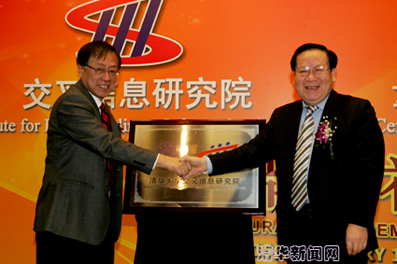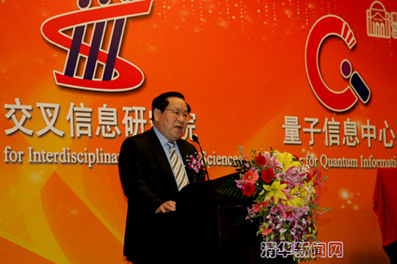
The Inauguration Ceremony of the Institute for Interdisciplinary Information Sciences (IIIS) and the Center for Quantum Information (CQI) was held at Tsinghua's FIT Building on January 15. Tsinghua University President Gu Binglin and Academician Andrew Chi-Chih Yao, Dean of the IIIS, jointly unveiled the plaques. Tsinghua University Council Chairperson Chen Xu hosted the ceremony.

Academician Sun Jiaguang, Vice Chairman of the National Natural Science Foundation of China, Mr. Lei Chaozi from Ministry of Education, and Professor Amy Yuexuan Wang, Deputy Dean of the IIIS, also attended the ceremony.

The IIIS was established on December 30, 2010. Professor Andrew Chi-Chih Yao, a world-leading computer scientist and winner of the A.M. Turing Award in 2000, became the first dean of the IIIS. It aims to become one of the world's leading research centers on interdisciplinary information sciences and offer an environment for research and education in theoretical computer science and quantum information science in China. The IIIS is an umbrella institute which hosts two research organizations, namely the Institute for Theoretical Computer Science (ITCS) and the Center for Quantum Information (CQI). The ITCS emphasizes the interaction between theoretical computer science and mathematics, while the CQI focuses on the interaction of computer science, information science and physics. The IIIS also hosts two international research centers, namely the Tsinghua-MIT-CUHK Research Center for Theoretical Computer Science, which was inaugurated in June 2010, and the forthcoming Tsinghua-Michigan Joint Center for Quantum Information.
In his remarks, Professor Yao said that Tsinghua has noteworthy advantages in information science and a solid foundation in the development of the relevant disciplines. The establishment of the IIIS indicates a new opportunity and is of great significance. The IIIS at Tsinghua University led by Professor Yao is devoted to promoting the innovative development of information science and cultivating the next generation of scientific talents in China. It provides a novel platform for the interaction of information science and other disciplines, especially physics, mathematics, life science, and social sciences.